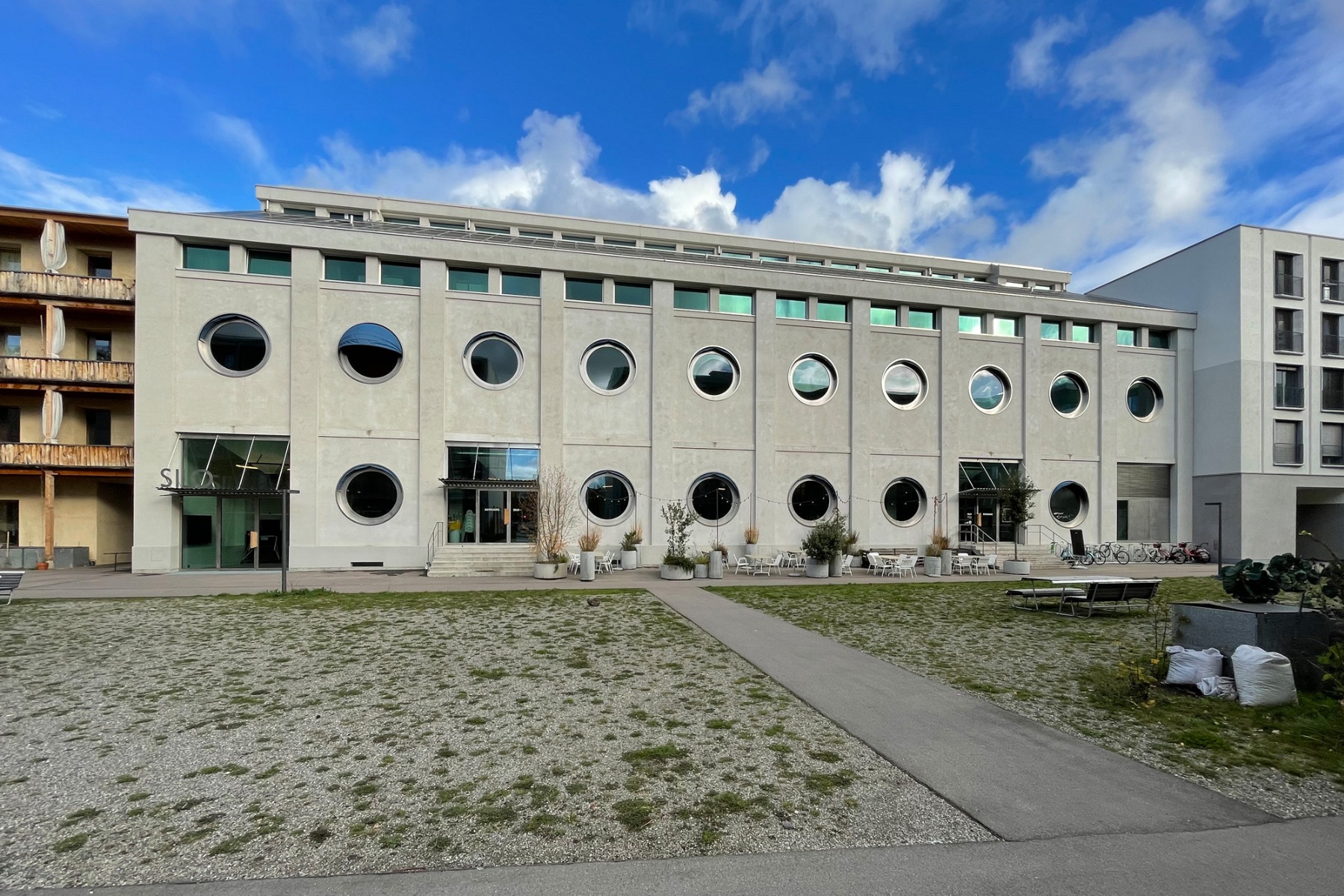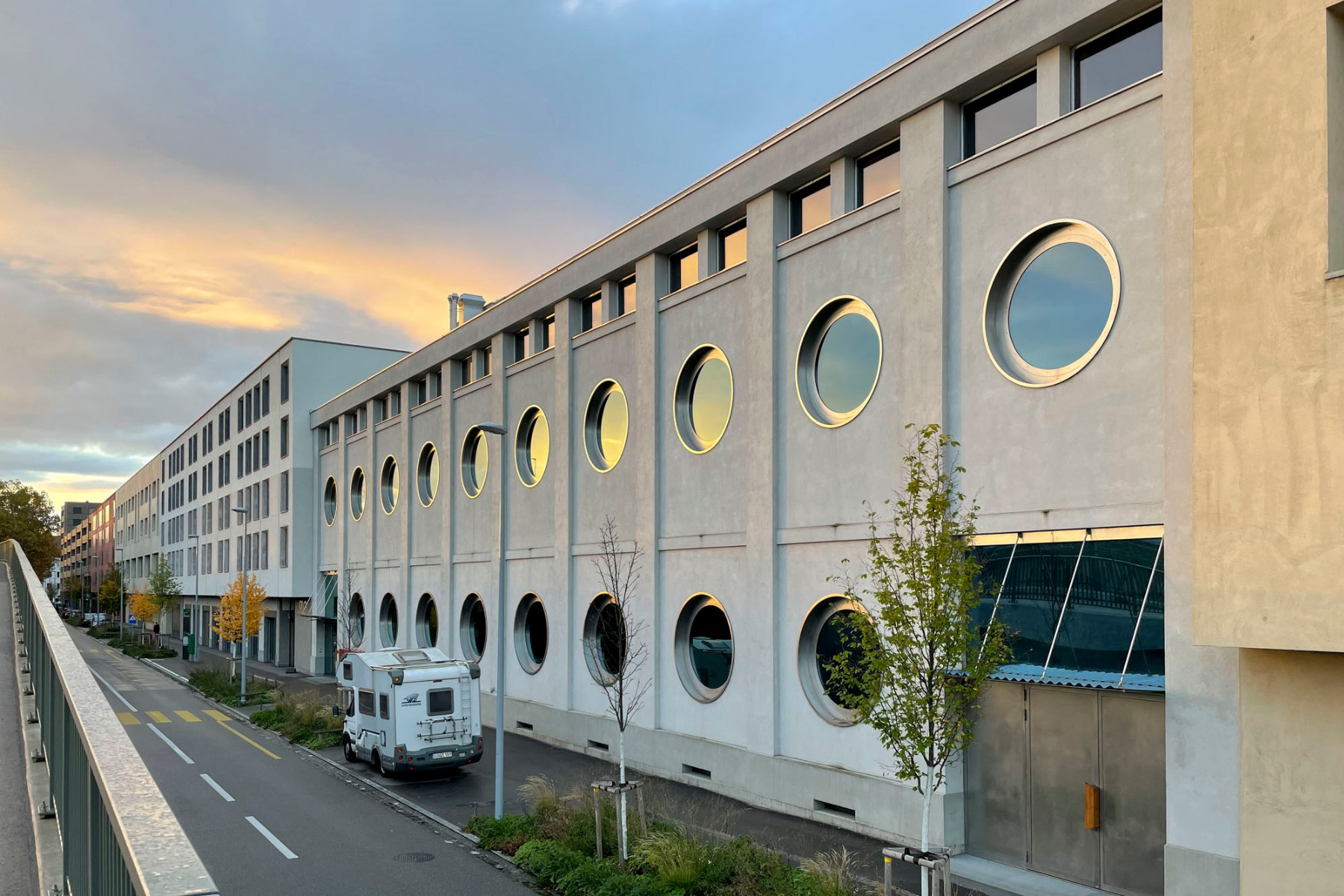Silo Erlenmatt in Basel
Test Bench for Up- and Coming Hoteliers

© Jakob Schoof
Harry Gugger Studio has converted Silo Erlenmatt into a hostel and restaurant operated by Verein Talent. Jonas Gass and Christoph Widmer, executives in the organisation, relate their experience with the project.
Verein Talent started operating the hostel and restaurant in 2019 after the originally interested party dropped out. What led the association to take this step and what goals does it have in connection with the project?
JG: Two of the association's executive board members had the idea of founding a talent incubator in Basel for up-and-coming hoteliers. The opportunity to take action presented itself when Stiftung Habitat was in search of a new operator for Silo Erlenmatt, and the two looked around for others in the branch to join the effort. Regarding myself and Christoph Widmer, we may come up from competing businesses, but in Verein Talent we pull together. That's the beauty of the project.
Mixed-use
The mix of uses in Silo Erlenmatt – ateliers on the one hand, a hostel on the other – was predetermined. Has this brought about synergistic effects?
JG: Not really. The tenants are much appreciated as restaurant guests but otherwise the two entities don't have particularly much to do with each other, not saying that in a negative way. On the other hand we notice the restaurant has become an important gathering space for local residents, and many of its diners come from the quarter.
CW: However there is a certain sense of entitlement on the part of the occupants and a number of conflicting goals. Which is not surprising as the concept of the Erlenmatt-Ost quarter involves a certain degree of idealism – i.e. a sharing of spaces and resources and no pursuit of profits – whereas Verein Talent is a commercial operation and has to be financially viable.
How is the association organised as operator of the building and what role does it take in relation to the managers of the building's facilities?
JG: You can compare Verein Talent to a supervisory or administrative board that hires managing directors and keeps an eye on economically efficient and legally-compliant running of the facilities. The entity running the facilities – a public limited company – is a subsidiary of the association. The contracts of the company's managing directors are always limited to two to three years, and when they go, the complete workforce goes with them.
CW: We also see ourselves as honorary advisers to the young talent in the hostel and help them to meet personal and economic challenges.
Where was your advice particularly needed during the pandemic?
JG: It was a challenge to keep up staff spirits during the lockdowns and restrictions. But as I see it, there was an even greater need for advice after the pandemic. The first change in the hostel's management was in summer 2022 with operations running at capacity. This inevitably raised questions about personnel management and the operational concept. As for the managing directors, it was their very first management position, and they had to slip out of the role of employee into that of managers at very short notice.
Managementkonzept
These frequent changes in personnel involve constant change in the management concept and the hostel's image. Is this something you are in favour of or would you prefer continuity in some respects?
JG: Accepting and welcoming such change has been a relearning process for Verein Talent too. Traditionally speaking, continuity has certain advantages in the hotel branch – you don't want to lose a hard-earned reputation or alienate regular guests. But change is part of the concept here. For example the new management is now bringing cultural events into the house and pursuing a more ambitious gastronomic concept. The fact that this attracts new target groups and loses old ones is normal. The team of young talents has to learn to see this as an opportunity, and keep to a concept once it has been formulated.
What is the general personnel situation in the Swiss hotel branch?
CW: The branch indeed has a considerable problem with recruitment, and at present numerous posts have still not been filled in the winter tourism destinations. Appreciable staff shortages also apply to many hospitality businesses here in Basel.
Have there been any changes in the types of guests; i.e. have there been more private travellers than business ones since the end of the pandemic?
JG: In 2021 I still thought we were indeed experiencing such a change, but in the meantime this has proved not to be the case and we basically have the same situation as in 2019. Business travellers are back again – also here at the hostel; after all, the double rooms we have in the roof storey are an attractive option for business trips on a small budget.


© Jonas Gass


© Christoph Widmer
Jonas Gass underwent training in hotel management at the Swiss Hotel Management School in Lucerne. Today he is general manager of Nomad Design & Lifestyle Hotels, director of operations at Volta Bräu Brewery and Brewpub and co-owner of the Basel-based Krafft Group, of which he is an executive board member.
Christoph Widmer is a trained chef and business administrator with an MBA degree. Since 2018 he has been an executive board member at Wyniger Group, which operates a number of hotels and hospitality businesses in the Basel region. Alongside his involvement in Verein Talent, Christoph Widmer has also set up the non-profit association Malian as a start-up concerned with social integration regarding employment.
Read more in Detail 3.2023 and in our databank Detail Inspiration.
Hersteller: X
Produkt: Y
Produktkategorie: Z



